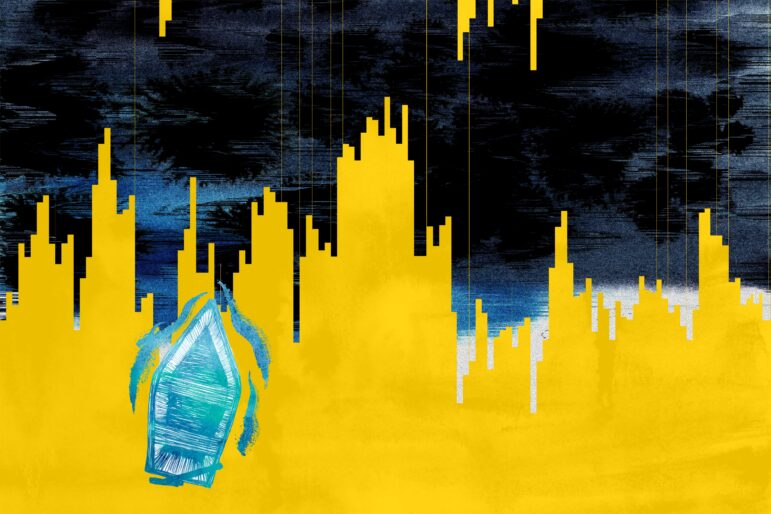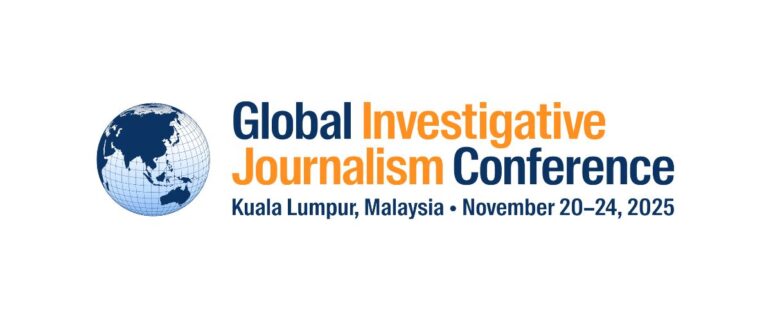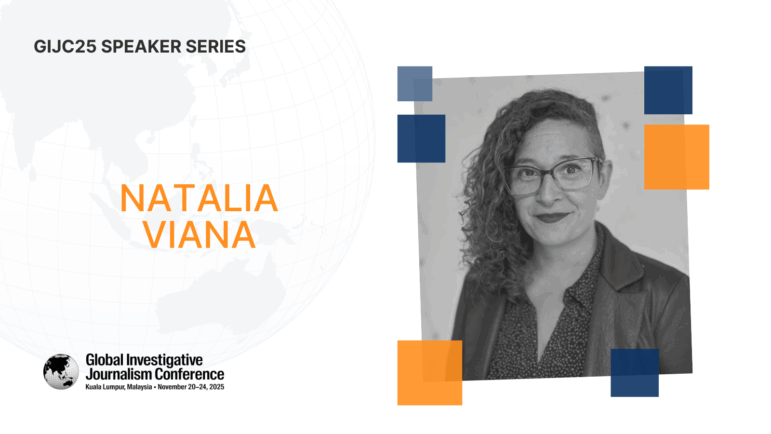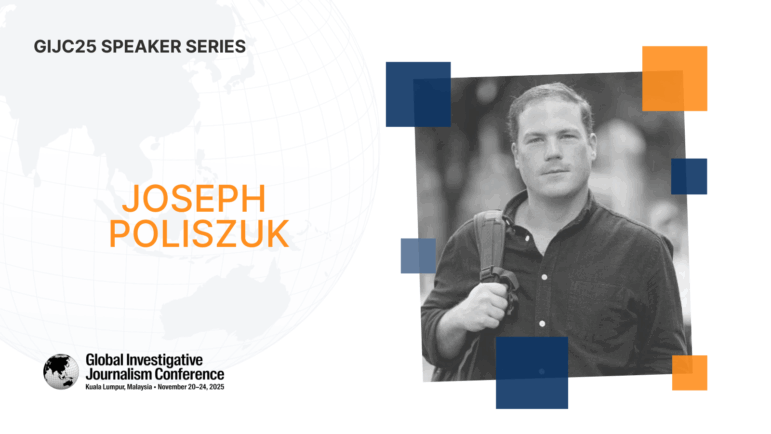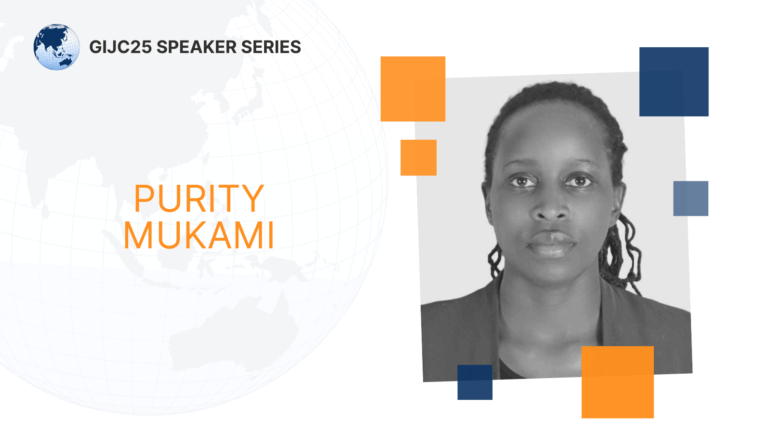

Image: GIJN
Editor’s Note: Ahead of the 14th Global Investigative Journalism Conference in Malaysia, GIJN is publishing a series of short interviews with a globally representative sample of conference speakers. These are among the more than 300 leading journalists and editors who will be sharing practical investigative tools and insights at the event.
Purity Mukami is one of the pioneering women reporters helping to build data journalism in Kenya, and has contributed key evidence and context for several groundbreaking corruption investigations in East Africa.
Trained as a statistician, Mukami was scouted in 2017 after Africa Uncensored co-founder John-Allan Namu noticed the advanced election data analysis on her personal Twitter feed, and her data journalism career was launched with a reporting role there. She later became Africa data lead for the Organized Crime and Corruption Reporting Project (OCCRP), and moved to a freelance role in June 2025 — using open source intelligence and data gathering techniques to uncover leads, strengthen existing investigations, and hold bad actors accountable.
In addition to contributions to global collaborations such as Dubai Unlocked, the Pandora Papers, and the FinCEN Files, her work has featured in blockbuster local investigations such as Client 13173: The Secret Offshore World of the Kenyatta Family, a wildlife trafficking story titled The Troubled Suspected COVID-19 Intermediary Host, and a leaks-based procurement scandal, Kenya: Institutionalised Theft and the High Cost of ‘Budgeted Corruption. She also contributed to an investigative documentary on systemic corruption, called Captured: Stella’s Web.
Mukami will share key insights and tools in a panel titled Connecting the Dots: Investigating with Data in Data-Scarce Contexts at GIJC25 in Kuala Lumpur.
GIJN: Of all the investigations you or your team have worked on, which has been your favorite, and why?
Purity Mukami: Each investigation I have worked on has been my favorite for one reason or another. Each project feels very meaningful in the end.
The stories I have worked on from the Pandora Papers are some of my favorite investigations. The project presented an unprecedented opportunity to practice and share my data skills with journalists from all over the world. Supporting Africa Uncensored with the project was a great way for me to give back to the place that introduced me to journalism. Given the fact that one of the stories was about the family that had given Kenya a president on two occasions, it was very humbling to see the care and thoroughness that editors such as John-Allan Namu, Nick Mathiason, Ted Jeory, and my then-colleagues Simon Bowers and Lionel Fall gave to the project. I remember John-Allan saying: “I have always wished I would work with such thorough colleagues.”
My very first investigative project to handle, Captured, is another of my favorites. When I first transitioned from academia into journalism, I believed the statistical models and formulas I had mastered would be powerful tools for uncovering budgeting corruption. My then-new boss, John-Allan Namu, had just received a leak of more than 25,000 government payment transactions, and together we thought this data would yield its secrets through methods like principal component analysis, regression, or Chi-square tests among others. But I quickly discovered that corruption doesn’t always leave neat, mathematical patterns. The data refused to conform, and the models offered little clarity. In the end, I had to return to the basics: simple tabulations, careful exploration, and following the story like a journalist rather than an academic. That shift became a turning point.
I learned how much stronger investigative work becomes when it draws on collaboration with graphic designers, video editors, producers, and other specialists who could help bring the findings to life. I gained some interview skills, and I found invaluable support from editors at Africa Uncensored, Finance Uncovered, The Elephant, ZAM Magazine, and OCCRP. Through this project, I met mentors who continue to shape my career.
GIJN: What are the biggest challenges for investigative reporting in your country?
PM: You know what amazes me? We have a law that obliges the government to provide information to citizens upon request, yet in reality, accessing that information is often nearly impossible — more like chasing shadows than exercising a right.
And then there’s the safety part. Many people do their work and can’t walk around without constantly looking over their shoulders, just as it is for investigative journalists in many other countries. Doing this job means always being alert, always weighing the risks. That feels wrong.
Another challenge, which I believe is common among freelancers, is the transition from a structured newsroom environment to independent work. After stepping down from my role as Africa data journalist at OCCRP, I have spent the past three months taking on freelance assignments. Although freelancing can sometimes yield higher earnings on a monthly basis, the work often feels uncertain. The absence of space to fully immerse myself in a single investigation has made it harder to sustain the same level of creative and investigative depth.
GIJN: What reporting tool, database, or technique have you found surprisingly useful in your investigations?
PM: OCCRP’s Aleph database has been one of my favorite investigative tools. The fact that I have been able to find a missing link in some of the most unexpected datasets — while using the same tool to store sensitive documents and create network diagrams — still blows my mind. Spreadsheets have also been really useful to organize my thoughts in timelines.
GIJN: What’s the best advice you’ve received from a peer or journalism conference — and what words of advice would you give an aspiring investigative journalist?
PM: One of my friends and my mentor, Kira Zalan, [an OCCRP investigative editor] once told me that working on an investigative piece is like giving birth to a child — and sometimes even more painful! At first I laughed, but the more I do this work, the more I get what she meant. One other thing I’ve also learned is to really trust my gut. Each time I’ve ignored it or second-guessed myself, I’ve ended up regretting it, whether it was missing a lead or misjudging a security situation.
GIJN: What topic blindspots or undercovered areas do you see in your region? And which of these are ripe for new investigation?
PM: Reporting on technology that is being used to curtail various freedoms — and going into the necessary depth — is under-reported in Africa. There can also be more reporting on climate change initiatives, and how it’s affecting local communities, and on who is benefiting from those initiatives. Both are ripe for new investigations.
GIJN: Can you share a notable mistake you’ve made in an investigation, or a regret, and share what lessons you took away?
PM: One mistake I’ve made is not really writing down or following through on some of my ideas. Later, I’d see similar things published, or realize I’d missed the chance to report on them before the adverse impact of the issue. I also regret not sticking with certain subjects or companies after the first investigation. Sometimes I moved on too quickly, instead of digging deeper or tracking the evolution of some of the subjects.
GIJN: Can you share an example of the kind of technique or insight you plan to highlight for GIJC25 attendees — or otherwise what you yourself are looking forward to in Malaysia, whether in terms of networking or learning about an emerging reporting challenge or approach?
PM: Often, investigations are about piecing dots together, and I’ve learned to find missing gaps in the most unlikely places, which is especially important in Africa, where data is scattered and isn’t always easily available or accessible. That challenge has pushed me to be more creative in how I approach stories. What I’m really looking forward to at this conference is the chance to meet and network with more journalists from that side of the world. With the event being closer to home, I expect many more journalists that I have not met before will be present, and I’m excited about the opportunity to exchange new ideas, build new connections, and hopefully collaborate.
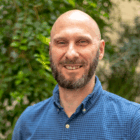 Rowan Philp is GIJN’s global reporter and impact editor. A former chief reporter for South Africa’s Sunday Times, he has reported on news, politics, corruption, and conflict from more than two dozen countries around the world, and has also served as an assignments editor for newsrooms in the UK, US, and Africa.
Rowan Philp is GIJN’s global reporter and impact editor. A former chief reporter for South Africa’s Sunday Times, he has reported on news, politics, corruption, and conflict from more than two dozen countries around the world, and has also served as an assignments editor for newsrooms in the UK, US, and Africa.


